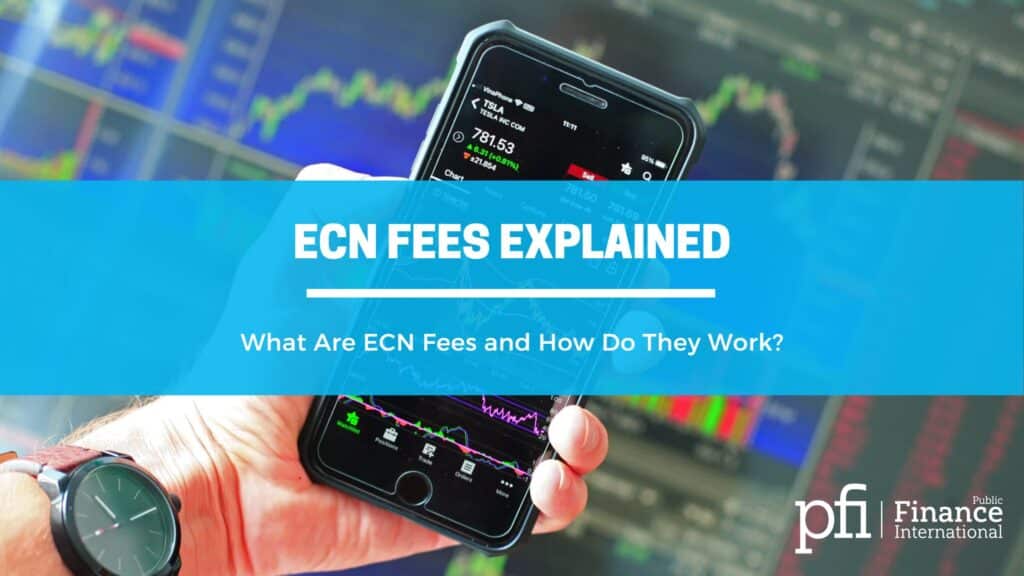ECN Fees are the fees charged by networks and exchanges that match buy and sell orders.
An ECN fee is charged whenever a secure transaction is conducted using an electronic communication network. ECN trading maintains market liquidity by regulating the bid-ask price and facilitating matching buy and sell orders.
It's a sum of fees charged for using an electronic communications network. Any buy or sell trade on the ECN will be labeled as removing liquidity and charged a fee.
Understanding ECNs
The electronic communication network is an alternative trading system that facilitates buyers and sellers to conduct trades with minimum interference from intermediaries. ECN trading is suitable for brokerages and individual traders in different geographic locations who wish to conduct trades without using conventional exchanges.
ECNs are automated systems displaying the best ask quotes and bids from several market stakeholders, matching them automatically, leading to effective order execution. Primarily, orders placed through ECNs are limit orders that come in handy for after-hours trading. As a computerized system, the ECN can be designed for institutional or retail investors.
These systems are accessible through a direct market access trading platform. The DMA broker trading platform allows investors to route their trades to the preferred ECN, providing the best pricing and liquidity.
Understanding Liquidity
Liquidity is referred to as the availability of shares ready to be bought or sold. Higher liquidity leads to tighter bid-ask prices, whereas lower liquidity leads to broader bid-ask prices and less availability of shares.
By bypassing market makers, the participants using ECNs add liquidity to the market by placing marketable limit orders when there are buy-on bid and sell on the ask. In contrast, the participants remove liquidity if they sell on the bid price and buy on the ask.
How Does Order Routing Work?
The broker in the routing process acts as a facilitator. Investors can choose how their order will be routed with a DMA or a retail broker.
If you choose a retail broker, the order is routed to a market maker or a liquidity provider with prearranged agreements. Unlike a retail broker, the DMA broker runs the order through an algorithm, allowing investors and traders to select their preferred ATS, market makers, ECN, or exchanges.
DMA brokers provide more control and transparency than the former. The order flow arrangements made by the broker provide them incentives for funneling these trades. While the practice is legal, the payments for order flow arrangements are kept transparent and regulated due to past abusive practices.
Common ECN Fees
Below we explain some of the common ECN fees.
Bid-Ask Spread
It's a markup on the asset and goes to the broker. Reliable ECN brokers start the spreads from zero pips but start the spread from 0.2 pips for major forex pairs.
Overnight Fee
Every CFD broker charges an overnight fee on leveraged or open positions left after trading hours. It's a negligible fee but can increase significantly when the positions are left open for longer.
Commission Per Lot Traded
Some ECN brokers don't start spreads but charge a fixed commission per lot. The commission varies, depending on the pair.
How Do ECN Fees Work?
Think of the electronic communication network as a bridge between buyers and sellers. Brokerage firms place tradable shares for a fee in the ECN ecosystem, increasing the share quantity and market liquidity.
The ECN fee is determined by the shares' trading volume and is a few cents per share traded. While the fee might not seem a lot for a small trade volume, the fee adds up to a significant amount when high volumes of trades occur.
How to Avoid ECN Fees
While avoiding the ECN fees completely is impossible, choosing an ECN broker with the lowest fee can make a difference. Here are some tips you can consider to avoid high ECN fees.
- Reliable ECN brokers have the best liquidity providers, resulting in lower fees and prices.
- Lack of information can be disastrous, so choose an ECN broker that is more transparent in terms of fees and cost of operations.
- Unlike paid platforms, free trading platforms that won't charge ECN fees are available.
- Depending on the broker and your geographic location, you can sign up for an ongoing promotion, providing additional features and benefits.
Advantages of Electronic Communication Networks
- ECN facilitates a brokerage firm or an investor to trade during off-trading hours, allowing a window for those unable to carry out regular market trades.
- Unlike traditional brokers, ECNs minimize spread and charge a lower commission and fee.
- Transactions through the system can be conducted anonymously for traders making large transactions who are concerned about their privacy.
Disadvantages of Electronic Communications Networks
- If you want to use an ECN, access fees and commission charges cannot be avoided. These fees, like commission-based charges, affect your profitability.
- The system lacks integrated charts and data. It works well for experienced traders but is a poor choice for beginners.
- Wider spreads can make it difficult for traders to break even.
Using an ECN in Forex Trading
ECNs effectively connect retail forex investors with brokerages. Investors can easily look up for ask quotes and bids offered by the market participants. The system will automatically match and execute.
Opening an ECN Account
Several ECN platforms offer traders the ability to create an account, yet these platforms cater to different market needs. It's best to do your research, figure out the right broker and platform that suits you the best and conduct successful transactions without any hassle.
The Difference Between STP and ECN
While ECN connects investors with several brokers and retail investors, STP brokers have select liquidity providers that the investors have to choose from.
Conclusion
It's always best to stay familiar with the ECN fees and schedules provided by your broker. Commission-free brokers don't offer direct access to the ECN, and you must process the orders through prearranged order flow agreements.
When opting for ECN trading, dedicate some time to research to find the best ECN platforms that charge a fee according to the current market price.




